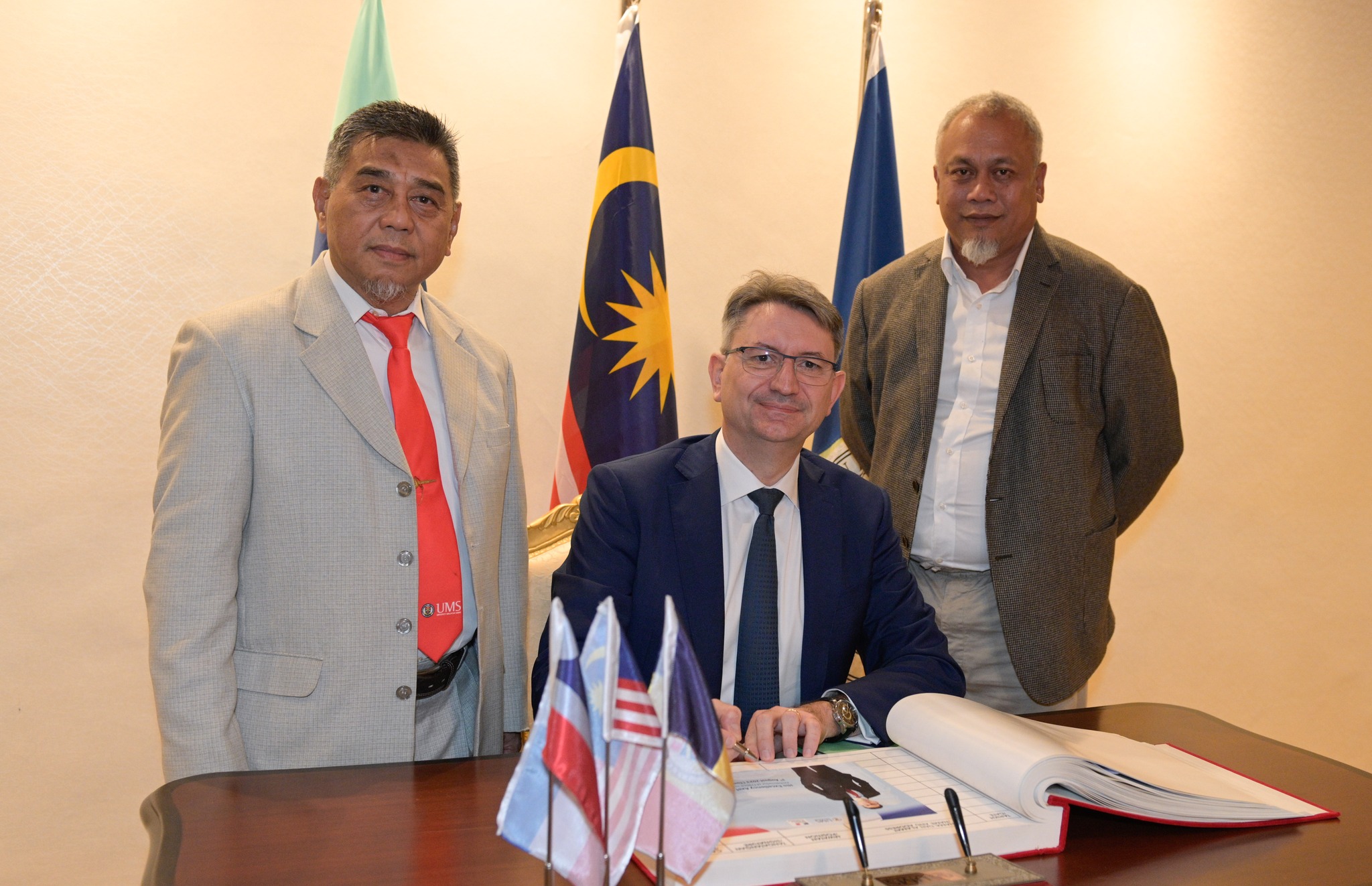 Universiti Malaysia Sabah (UMS) spearheads bamboo tissue culture for the use in sustainable construction materials and climate change mitigation through bamboo tissue culture research.
Universiti Malaysia Sabah (UMS) spearheads bamboo tissue culture for the use in sustainable construction materials and climate change mitigation through bamboo tissue culture research.
This groundbreaking cultivation technique, led by Associate Professor Dr Wilson Yong from Biotechnology Research Institute (BRI) UMS, has the potential to transform the construction industry and promote environmental conservation.
According to the BRI director, Professor Dr. Lee Ping Chin, UMS has the capacity to produce 5000 tissue culture seedlings per month to meet the growing demand of the plantation industry.
“Dr. Wilson Yong and his dedicated research team have devoted significant efforts to perfecting the cultivation of giant timber bamboo species, notably Dendrocalamus asper (Betung Bamboo) and Gigantochloa levis (Poring Bamboo).
“These bamboo varieties possess exceptional strength, durability, and rapid growth rates, making them ideal candidates for sustainable construction materials and a promising alternative to timber and steel,” she said.
The widespread use of bamboo in the construction industry has the potential to significantly reduce carbon emissions associated with resource-intensive materials while simultaneously contributing to the preservation of forests.
“The Nagao Natural Environment Foundation also provided funding to the research team to identify potential endemic bamboo varieties using DNA barcoding as a foundation for bamboo germplasm conservation and long-term genetic diversity utilization.
“An inherent advantage of bamboo lies in its capacity to sequester carbon dioxide. As bamboo plants grow, they absorb carbon dioxide from the atmosphere, acting as natural carbon sinks. Leveraging this unique attribute, the cultivation of bamboo holds immense potential for combatting climate change,” she added.
Meanwhile, Deputy Vice-Chancellor of Research and Innovation of UMS, Professor Ir. Dr. Rosalam Sarbatly strongly support the collaborative efforts from all stakeholders and embraces the potential of bamboo tissue culture, realizing its capacity to revolutionize construction practices, combat climate change, and pave the way for a sustainable and prosperous future.
He further said, encouraging local governments to establish bamboo plantations could make substantial contributions to carbon dioxide mitigation efforts while generating valuable carbon credits.
“Such efforts would create a virtuous cycle of sustainable construction, carbon sequestration, and economic opportunities, aligning with international agreements' climate change objectives.
“Driving the transition from research to practical applications, the researchers have forged strong collaborations with local industry players, including Balung Plantation, KB Agro Tech, and Koperasi Wawasan Rakyat Sabah Berhad.
“These collaborations facilitate the seamless translation of research findings into large-scale cultivation and industrial production, making sustainable bamboo materials more accessible and commercially viable,” Rosalam said.
He said this in conjunction with the visit of the Minister of Higher Education, Dato’ Seri Mohamed Khaled Nordin to UMS, recently. The minister emphasized the importance of seedling production, saying that planting the proper and enhanced bamboo species will help the society and the related industry.
Also present were the Deputy Secretary General, Ministry fo Higher Education (MOHE), Dato' Dr. Haji Megat Sany bin Megat Ahmad Supian; Director General of Higher Education, Prof. Dr. Azlinda Azman; Chairman of the UMS Board of Directors, Datuk Seri Panglima Abdul Rahman Dahlan and the Vice Chancellor of UMS, Prof. Datuk Dr. Kasim Hj. Mansor.
 KOTA KINABALU: France Ambassador to Malaysia, Axel Cruau, has expressed hopes for academic collaboration between several universities in France with universities in Malaysia, including Universiti Malaysia Sabah (UMS).
KOTA KINABALU: France Ambassador to Malaysia, Axel Cruau, has expressed hopes for academic collaboration between several universities in France with universities in Malaysia, including Universiti Malaysia Sabah (UMS).


 Universiti Malaysia Sabah (UMS) will strengthen its collaboration in academics and technology with one of the largest dredging companies, CCCC Dredging (Group) Co. Ltd (CDC), through its Confucius Institute at UMS (CI@UMS).
Universiti Malaysia Sabah (UMS) will strengthen its collaboration in academics and technology with one of the largest dredging companies, CCCC Dredging (Group) Co. Ltd (CDC), through its Confucius Institute at UMS (CI@UMS). An online international community service webinar titled ‘The Importance of Digital Portfolio’ was delivered by lecturer and coordinator of D4 Digital Office Administration Study Program, Universitas Negeri Jakarta (UNJ), Dr. Christian Wiradendi Wolor, S.E., M.M., recently.
An online international community service webinar titled ‘The Importance of Digital Portfolio’ was delivered by lecturer and coordinator of D4 Digital Office Administration Study Program, Universitas Negeri Jakarta (UNJ), Dr. Christian Wiradendi Wolor, S.E., M.M., recently. Duta Besar Romania ke Malaysia dan Brunei Darussalam, Nineta Barbulescu berhasrat untuk meneroka potensi jalinan hubungan dua hala antara Universiti Malaysia Sabah (UMS) dan universiti-universiti di Romania.
Duta Besar Romania ke Malaysia dan Brunei Darussalam, Nineta Barbulescu berhasrat untuk meneroka potensi jalinan hubungan dua hala antara Universiti Malaysia Sabah (UMS) dan universiti-universiti di Romania. Universiti Malaysia Sabah (UMS) spearheads bamboo tissue culture for the use in sustainable construction materials and climate change mitigation through bamboo tissue culture research.
Universiti Malaysia Sabah (UMS) spearheads bamboo tissue culture for the use in sustainable construction materials and climate change mitigation through bamboo tissue culture research.